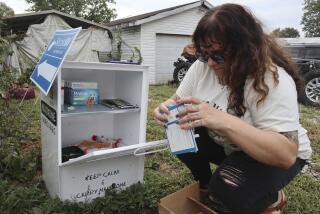Bold Attack on Teen-Age Pregnancy : Baltimore offers the Norplant contraceptive--in an effort to reduce unwanted pregancies
- Share via
Against the backdrop of the Los Angeles School Board’s controversial decision last year to permit the distribution of condoms to high school students, the efforts of Baltimore officials to promote the contraceptive Norplant among teen-agers there is most courageous.
Starting next month, a consortium of hospitals, doctors and a private foundation hopes to provide information about Norplant in family life classes at public schools as well as offer to implant the Norplant device in students through school clinics. The group also wants to advertise Norplant on Baltimore television and radio. Eventually the consortium will work with local clinics outside the schools.
Norplant consists of six matchstick-size capsules inserted under the skin on the underside of a woman’s upper arm. They release a contraceptive hormone for five years.
Norplant has generated interest--and controversy--since it became available in the United States in early 1991 following approval by the Food and Drug Administration. About 500,000 women now use it. Some report side effects, including irregular menstrual bleeding. Insertion takes less than 10 minutes and can be performed by a doctor or trained nurse. When the capsules are removed, also through surgery, the woman’s fertility is restored.
Maryland schools have been dispensing contraceptives for two years, but few have gone as far as Baltimore’s in prescribing birth control pills for students who request them.
Los Angeles high schools began condom distribution in April. The notion of dispensing condoms in schools has generated controversy across the United States.
Baltimore officials say the Norplant campaign will be designed so that students will not feel they are being encouraged to become sexually active, and that poor youths do not feel coerced into having the implantation.
Sadly, Baltimore’s decision to offer Norplant reflects as much a sense of desperation about teen-age pregnancy as it does the desire to offer students the widest possible range of contraceptive choice. One in 10 Baltimore girls from ages 15 to 17 gave birth in 1990. One official estimates that three-quarters of Baltimore students are sexually active. Norplant may be a more reliable method of contraception for teen-agers than condoms or pills. But it does nothing to prevent sexually transmitted diseases, including AIDS, or to teach responsible behavior.
Even so, this experiment is worth watching very closely indeed.
More to Read
Sign up for Essential California
The most important California stories and recommendations in your inbox every morning.
You may occasionally receive promotional content from the Los Angeles Times.










